- Home
- Linda Byler
Home Is Where the Heart Is
Home Is Where the Heart Is Read online
The characters and events in this book are the creation of the author, and any resemblance to actual persons or events is coincidental.
HOME IS WHERE THE HEART IS
Copyright © 2018 by Linda Byler
All rights reserved. No part of this book may be reproduced in any manner without the express written consent of the publisher, except in the case of brief excerpts in critical reviews or articles. All inquiries should be addressed to Good Books, 307 West 36th Street, 11th Floor, New York, NY 10018.
Good Books books may be purchased in bulk at special discounts for sales promotion, corporate gifts, fund-raising, or educational purposes. Special editions can also be created to specifications. For details, contact the Special Sales Department, Good Books, 307 West 36th Street, 11th Floor, New York, NY 10018 or [email protected].
Good Books is an imprint of Skyhorse Publishing, Inc.®, a Delaware corporation.
Visit our website at www.goodbooks.com.
10 9 8 7 6 5 4 3 2 1
Library of Congress Cataloging-in-Publication Data is available on file.
ISBN: 978-1-68099-354-7
eBook ISBN: 978-1-68099-365-3
Cover design by Jenny Zemanek
Printed in the United States of America
TABLE OF CONTENTS
The Story
Glossary
Other Books by Linda Byler
About the Author
CHAPTER 1
SPRING ARRIVED ON THE NORTH DAKOTA PLAINS LIKE A FLIRTATIOUS young girl that whispered promises of warmth and sunshine, melting icicles and turning snowdrifts into untrustworthy mounts of sodden slush.
The long drought had come to an end thanks to the melting snow and ice that replenished the arid soil, turning the prairie into a quagmire of slick brown mud and crumpled yellow grass.
Hannah stepped off the porch, a woven basket full of wet clothes balanced on one hip and an apron containing wooden clothes pegs tied around her narrow waist. A married woman now, she still resembled the same Hannah Detweiler she’d always been.
Dark-haired, with dark eyes like wet coal, defiant, missing nothing, she strode to the wash line like a soldier, threw down the basket, and proceeded to hang clothes on the line in quick, furtive movements.
Hurrying back to the house, she looked neither right nor left, her mind churning on the best way to accomplish all that needed to be done when spring actually arrived.
The two-year drought had depleted her herd of cows to five head. Jerry said he’d had money put by when they were married in the fall of the year, but lately he’d given no indication of a stash of money or a checkbook. Her mother and siblings had returned to the home of their birth, with all the rest of the Amish folks who’d been bitten by the pioneer spirit but chickened out when it stopped raining. Soft Lancaster County stock that had everything handed to them by their fathers, and their fathers before them.
What did they expect in North Dakota?
Her mother wrote lengthy accounts of their lives back in Pennsylvania. Manasses (Manny) had begun courting Ike Lapp’s adopted daughter, Marybelle, who was working as a hired hand for Sammy Stoltzfus, Rufus’s Sammy. She lived with her aging father and two brothers on the homestead. Mary and Eli went to school in Leacock Township. Hannah read every letter with interest, but always threw them down as soon as she was done, as if she couldn’t bear to think too much about the contents.
Deserters. That’s what they were. It still stung about Manny. She never thought he’d leave the ranch. After all they’d been through, he followed his mother back East like the obedient puppy he was.
Well, she had Jerry, who’d married her, which was something. She had told him there would be no love involved. She wanted to stay on the ranch and his money was the only way they could. It was an arrangement that worked well, so far. Jerry was kind, talkative, but kept his distance. Like brother and sister, they lived together in the sprawling ranch house made of lumber that had been shipped from the East, already weathered gray, with a porch along the front, and a barn with a low-pitched roof and a barnyard. The windmill churned about three hundred yards behind the barn. There were five head of Black Angus cattle, four of Jerry’s horses, and a few good mousers, wild as cougars, that slunk around the perimeter of the barn.
Beyond, there was only the vast immensity of the North Dakota plains, stretching in all four directions to a level horizon, limp brown grass, dead from the long drought, huddled in clumps of leftover dirty snow.
Hannah loved the land with an unexplainable passion. The emptiness and solitude suited her reclusive nature. She could breathe, expand, fill her lungs with the air no one else breathed, a luxury that was priceless.
People were like clinging vines, parasitic growths that wound their way around your well-being until the life was choked out of you. Most people annoyed Hannah. Especially men. Loud, sure of their own decisions, acting so superior to women, she couldn’t stand any of them. Well, maybe Hod Jenkins. He knew more about this prairie, the weather, cattle, everything, than anyone she’d known.
If her mother had not been so devoted to her Amish heritage, she could have married Hod after Abigail died.
Hod loved the land, same as Hannah. She looked out across the wet prairie as she hung up the second basket of clothes, watching for Jerry. He’d ridden to the Jenkinses’ without saying why, so she supposed he’d be back before dinner.
That was another thing she hadn’t bargained for—marrying Jerry. She cooked three meals a day, but she hated it. Told him so, too. He’d grin good-naturedly, get down the cast-iron skillet, fry a few pieces of beef, and eat it with bread she had baked.
The bread was coarse and hard as a rock. She sawed at it with the bread knife, served it, and never said a word, so Jerry didn’t either. The poor man tried to sop up the lumpy ground beef gravy to soften it, but it acted like a metal spoon and shoved all the gravy around on his plate. His mouth twitched, Hannah had seen it, his desperation to keep from laughing. She’d yanked her plate off the table, ran the dishwater, and hid her flaming face. She couldn’t help if she couldn’t bake a decent loaf of bread. Besides, he’d better count his lucky stars that she baked anything at all, with provisions so meager and times so hard.
Jerry didn’t say much, ever. There were a thousand questions she wanted to ask him, but would never risk throwing them out into the air heavy with tension. Especially her insatiable wondering about this new winter wheat everyone was talking about.
What if they could raise a profitable crop along with the cows? Acres and acres of soft winter wheat that was sown in the fall, sprouted sturdily in spring, soaking up the cold rains and flourishing in the summer sun.
Other than Hod Jenkins, Jerry was the only person Hannah felt the slightest twinge of respect for. He was tall, wide in the shoulders, his long, dark hair often hiding his expression. A solid jaw, a wide mouth, and eyes as black as her own.
Jerry had loved her, pursued her, even kissed her at every opportune moment a few years ago when he thought he had a chance with her. Which he didn’t. Still didn’t, in spite of being married to her. She’d made that very clear. Only for his money, the last chance to get this homestead up and running. If they failed now, she saw no reason to keep trying.
She swept the wide, varnished boards of the living room floor, shook a few rag rugs out the door, then took up a soft cloth and began to dust the tops of the furniture.
The playful breezes set a loose board to whirring at the corner of the house, so she made a mental note to tell Jerry. Or, better yet, she’d fix it herself. She finished her cleaning, went to the barn to find the wooden stepladder and a hammer, rooted around on the tool bench until she found a few nails, and carried it
all back to the house in quick strides.
She was settling the stepladder, trying to find a level spot so she could climb up to the eaves and fasten the loose board, when she felt hoofbeats vibrating the ground beneath her feet.
A rider appeared, bent low over his plunging horse, galloping in a headlong dash and throwing mud and dead grass, the white lather coating the wet coat of the winded animal.
Hannah stood rooted to the ground, not a muscle moving, as she watched the horse and its rider approach.
Closer he came. She gripped the handle of her hammer. Her breath quickened. A small man, he was wearing a flat-crowned, greasy hat, the brim flapping drunkenly. Soiled clothing, a coat that flapped open, revealing a torn shirt. When the horse slid to a stop, she knew who it was before she actually saw the sizzle of desperation in his eyes.
Lemuel Short! Old, wizened, hardened by another stint in prison, coming back to haunt her. The horse hung his head, his sides heaving, drops of sweat and flecks of foam dropping to the mud below.
“Hide me,” Lemuel rasped. “They’re after me!”
Hannah gripped her hammer and tossed her head. “I’m not hiding you. You want me to get in trouble with the law, same as you?”
Lemuel Short, small, tough, and wiry. He had terrorized the whole family after they’d shown him all that dumb kindness, nursing him back to health with the Scripture about loving your enemy seared into their consciences.
She looked up into the cold metal barrel of a pistol held by a thin claw that shook violently. Hannah didn’t think. Propelled by a fierce disdain for this desperate little liar, she stepped up as fast as midsummer lightning, swung her hammer, and knocked the revolver out of his hand.
It clattered to the ground. Hannah swung the hammer again, hitting the haunches of the sweating horse, frightening him into a swift gallop, Lemuel hanging on to the saddle horn as he fought to insert his feet into the stirrups.
Hannah heard the receding hoofbeats, the unintelligible screams of the escaped prisoner, shrugged, and bent to retrieve the revolver, turning it over and over, noticing its silver gleam, the deadly shape of it. Stolen, too, no doubt, same as the horse. Well, it might come in handy, so she’d hang on to it. She turned to finish the job of nailing down the loose board, unshaken, her hands steady.
She wasn’t afraid of him. Never had been. The sheriff would find him again and stick him back in jail, same as he always had.
She whistled low under her breath as she watched Jerry’s arrival, forgetting about the silver revolver lying in the grass until he rode up to the house and stopped his horse, a question in his eyes.
“What?” Hannah asked.
“What yourself. What are you doing up on that stepladder?”
“What does it look like? Fixing a loose board.”
“And what is this?” Jerry dismounted in one graceful, fluid movement, bending to lift the pistol in one hand and giving a low whistle. He looked up at Hannah. “I guess this fell from the sky?”
“Not exactly. Remember Lemuel Short?”
Jerry nodded, his heavy eyebrows drawn down.
“He rode in on a lathered horse and asked me to hide him. I told him I wasn’t going to do it. He aimed that thing at me, and I knocked it out of his hand with my hammer.” She jutted her jaw in the direction of the gun, shrugged her shoulders, and climbed down the stepladder, cool and unruffled.
Jerry watched her fold the hinges of the ladder, his mouth dropping open in amazement. Finally he said, “I hope you’re aware of how easily you could have been killed.”
Hannah gave her legendary snort. “He’s like a harmless little rat. He’s afraid of his own shadow. He thinks he can go around scaring people. Puh!”
Jerry looked at Hannah with an undetermined expression, then turned to go into the house. Over his shoulder he said he was hungry. Which meant she was expected to follow him and come up with a tasty dish in less than half an hour.
Instant rebellion! What was it about men, looking at a clock three times a day and thinking about their empty stomachs and a handy wife to cook them a delicious meal? She’d never get used to it. Never. What she felt like doing was telling him to get his own dinner. He knew how to fry mush, or a few strips of beef.
She walked stiffly into the house and began slamming cast-iron pans about on the cook stove top, harder than necessary so Jerry would know she was not pleased with him.
Jerry threw himself on a wooden chair on the porch, removed his straw hat, and raked his hands through his long, dark hair. He listened to the banging in the kitchen, smiled ruefully, and then looked out across the prairie.
What he wanted to do was go to the kitchen, tell her to go ahead and finish whatever she’d been doing outside, and he’d prepare dinner. But after living with her for a winter, he knew this was no ordinary girl who could be won with love and kindness.
He had married a hornet’s nest of self-will, single-minded ambition bordering on obsession, the success of the ranch occupying most of her thoughts. Without fear, she was bold, having no respect for men, needing no lady friends as far as he could tell. She was the biggest challenge he had ever undertaken.
He had loved her for years. Ever since the day she drove that open buggy into the forebay of his barn in Lancaster County, soaking wet and irritable as the proverbial wet hen. Did he love her still?
His gaze was soft, filled with a nameless emotion, as he pondered their six months of cohabitation. They lived together but certainly not in peace and harmony. He had never held her hand or slipped an arm about her waist. He’d promised to keep his distance. Their marriage was only one of convenience. She needed his money to keep the ranch going.
What would the Amish in Lancaster County think if they knew? This was certainly not what he had been taught. Or she. Defeat rose its hideous visage and swept through him in a cold chill. It was just much harder than he had imagined. She did everything she could possibly think of to irritate him, to drive him to the edge of patience and understanding. And he had never figured out why.
He was ready to admit that God alone could change her temperament, change the way she looked at the world through her dark, angry eyes. He had always thought that love never failed, love opened doors, broke down barriers, acquired the seemingly impossible.
He wasn’t so sure anymore.
Each day was a genuine battle. She needed good old-fashioned discipline but woe to the person who would deliver it. He grinned, listened to the pans banging and the dishes clattering. He’d continue praying, believing there was a reason he had always loved her, and see what God had in store for them both.
Jerry sat down at the table, waiting until she joined him, then bowed his head in silent prayer before lifting his fork to shove the fried meat to the side, helping himself to some green mush that vaguely resembled beans. Applesauce on the side, or was it some kind of preserve?
Grease and blood pooled around the meat. Underdone again. Grimly he cut it with his knife, lifted a forkful to his mouth, and chewed, ignoring the taste of raw meat and blood. Hannah ate very little, choosing the unnamed vegetable and bread and molasses. So Jerry helped himself to another piece of meat, which seemed to be a bit better than the first.
She wanted to ask him what he’d learned at the Jenkinses’ but figured if he wanted her to know, he’d tell her.
He finished his food, leaned back in his chair, and told her about Hod and his two boys riding out on the prairie for a cattle check. Mild winter, less snow, but the wolves got too many of the calves. They figured at least ten or twelve of them.
Hannah nodded, her eyes averted as she toyed with her fork. “It’s always been that way,” she said dryly.
“Why wouldn’t we try to raise something else, like sheep or goats or simply forget cattle and raise horses?” Jerry asked.
Hannah considered his question and for once came up empty. She shrugged. Jerry pushed back his plate, tilted his chair on two legs, his shoulders wide, hands in his pockets, his too-long hair
falling into his eyes. Hannah looked away.
“I mean, surely there is something we could do to make a living, to keep the ranch going until it’s ours, that isn’t quite as dependent on the weather, which seems to be the biggest problem so far.”
“Smart man,” Hannah answered, a touch of mockery in her voice. Jerry chose to ignore the bait for an argument.
“There’s this new strain of wheat. Winter wheat. Sow it in the fall, reap it in early summer before the drought hits. Hod talked about it. But you need to till acres and acres and with this soil … I don’t know. I can only see reasonable profits with gas-powered tractors. Unless we find a tough breed of horses. Belgians? Mules? What do you think?”
A shadow crossed Hannah’s face, a slice of dark remembering … the dying horse, the heat, the fanatic belief of her father. She clenched her jaw, her eyes hard and glistening. “What makes you think we couldn’t use a tractor?” she asked.
“Hannah, we’re of the Amish faith, and our bishops don’t approve of modern machinery. So, if we’re going to consider this winter wheat, I would suggest mules. They’re tough and they’re easy to keep. So, why not?”
“I won’t allow any animal, horse or mule, to plow this prairie,” she said, with so much force that she left her chair in one quick motion. Jerry raised his eyebrows and leaned forward until the front legs of the wooden chair banged against the oak floor.
“I didn’t say that was a definite plan.”
“Well, it’s not.”
“Why?”
Hannah turned to face him, her hands on her hips. “You weren’t here to see my father kill Dan in the plow. He ran that horse until he fell over. Dan’s breathing, the foam and sweat, the way the sun beat down …” Her voice trailed off. She turned to grip the edge of the sink and gazed across the brown landscape.
Jerry could tell how agitated she was by the rise and fall of her shoulders. He wanted to go to her, place his hands on her shoulders, and comfort her as best he could. But he didn’t have the courage, so he stayed put.

 A Second Chance
A Second Chance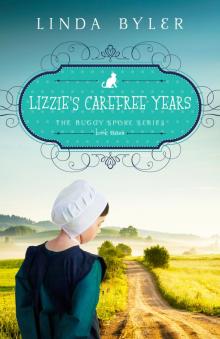 Lizzie's Carefree Years
Lizzie's Carefree Years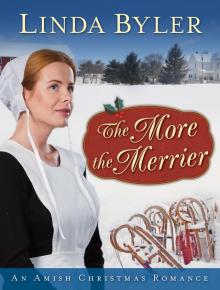 The More the Merrier
The More the Merrier Love in Unlikely Places
Love in Unlikely Places Running Around (and Such)
Running Around (and Such) Wild Horses
Wild Horses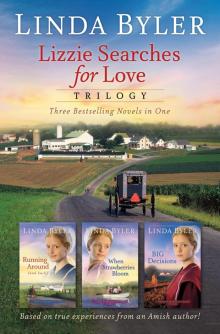 Lizzie Searches for Love Trilogy
Lizzie Searches for Love Trilogy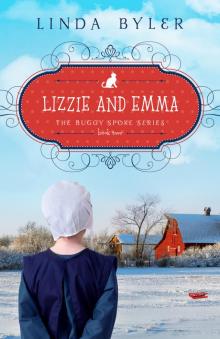 Lizzie and Emma
Lizzie and Emma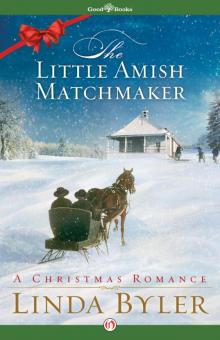 Little Amish Matchmaker
Little Amish Matchmaker The Witnesses
The Witnesses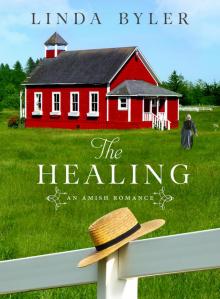 The Healing
The Healing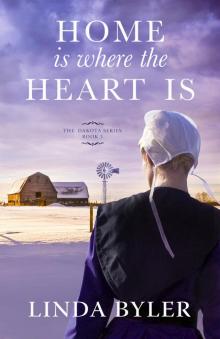 Home Is Where the Heart Is
Home Is Where the Heart Is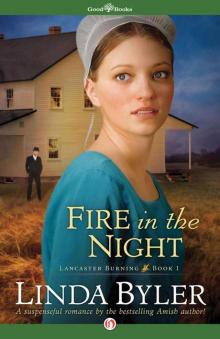 Fire in the Night
Fire in the Night When Strawberries Bloom
When Strawberries Bloom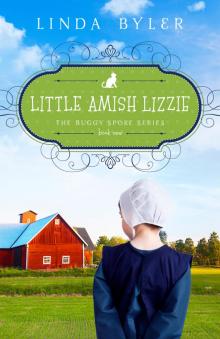 Little Amish Lizzie
Little Amish Lizzie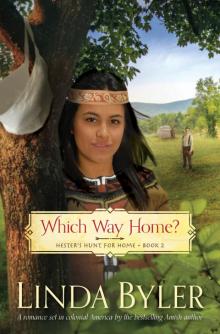 Which Way Home?
Which Way Home?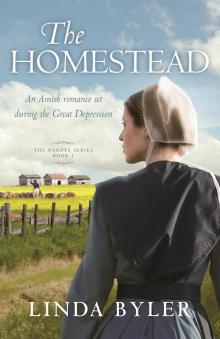 The Homestead
The Homestead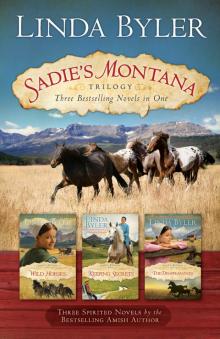 Sadie’s Montana Trilogy
Sadie’s Montana Trilogy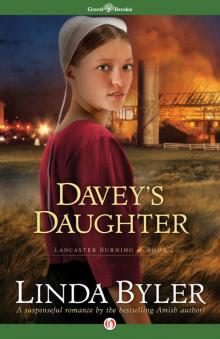 Davey's Daughter
Davey's Daughter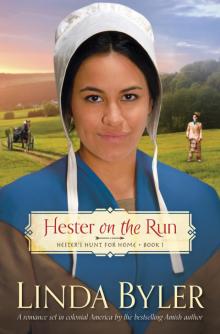 Hester on the Run
Hester on the Run Disappearances
Disappearances Big Decisions
Big Decisions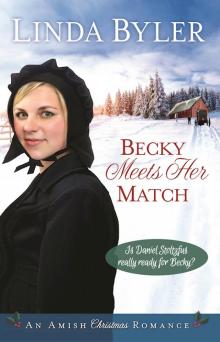 Becky Meets Her Match
Becky Meets Her Match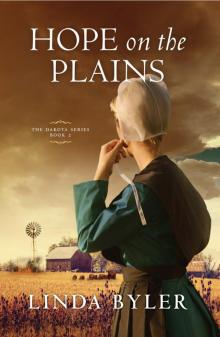 Hope on the Plains
Hope on the Plains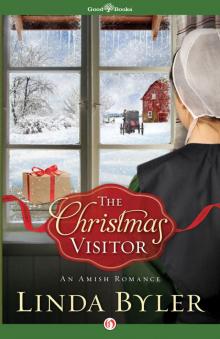 Christmas Visitor
Christmas Visitor